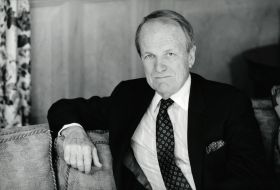Oscar for Lifetime Achievement. 15 Emmys. Worked with seven US presidents. Founding Director of the American Film Institute. Co-founded, wrote and produced the Kennedy Center Honors, 1978-2014. Author and playwright. Iconic journalist Edward R. Murrow was a mentor in JFK’s New Frontier.
George Stevens, Jr. has spent an illustrious career behind and around the camera. Finally, a master storyteller shares his own unique and extraordinary story, with touching insight and historical perspective in My Place in the Sun: Life in the Golden Age of Hollywood and Washington that was published last summer to great fanfare. Now, in his own voice, the AUDIO BOOK is available on Spotify and 28 platforms.
Stevens, Jr. tells an intimate and moving tale of his relationship with his Oscar-winning father and how he emerged from his father’s shadow to claim his own place as a major force in American culture through his own exciting career in Hollywood and Washington. Fascinating people, priceless stories and a behind-the-scenes view of some of America's major cultural and political events grace this riveting memoir.
Stevens, Jr. grew up in Hollywood working on film classics with his father and writes vividly of his experience on the sets of A Place in the Sun (1951), Shane (1953), Giant (1956) and The Diary of Anne Frank (1958). He explores how the magnitude of his father's talent and achievements left him with questions about his own abilities and future.
He began to forge his unique bi-coastal career when the legendary broadcaster Edward R. Murrow recruited him to work at the United States Information Agency in John F. Kennedy's New Frontier. He moved from Hollywood to Washington in 1962 and initiated what has been called the Golden Age of USIA filmmaking. In 1967 he became the founding director of the American Film Institute, shepherding the rescue of 10,000 endangered motion pictures (the AFI Collection now contains over 40,000 films), and creating the AFI Conservatory to train a new generation of filmmakers. He created the Kennedy Center Honors and made distinguished films and TV programs that explored social justice.
Stevens, Jr. provides a fascinating look at his pioneering American family that spans five generations in the performing arts. He shows us the private side of the dazzling array of people who cross his path, including Elizabeth Taylor, Sidney Poitier, Alfred Hitchcock, Maya Angelou, Fred Astaire, Robert and Ethel Kennedy, Yo-Yo Ma, Cary Grant, James Dean, Muhammad Ali, Bruce Springsteen, Barack Obama, and many more.
Please let me know if you would be interested in having George Stevens Jr. on your program.
George Stevens, Jr. has achieved an extraordinary creative legacy over a career spanning more than 60 years. He is a writer, director, producer, playwright and author. He has enriched the film and television arts as a filmmaker and is widely credited with bringing style and taste to the national television events he has conceived.
As a writer, director and producer, Stevens has earned many accolades, including 15 Emmys, two Peabody Awards for Meritorious Service to Broadcasting, the Humanitas Prize and 8 awards from the Writers Guild of America, including the Paul Selvin Award for writing that embodies civil rights and liberties. In 2012 the Board of Governors of the Academy of Motion Picture Arts and Sciences voted to present Stevens with an Honorary Academy Award for “extraordinary distinction in lifetime achievement.”
Stevens served for eight years as Co-chairman of the President’s Committee on the Arts and Humanities following his appointment by President Obama in 2009.
Stevens is Founding Director of the American Film Institute and during his tenure, more than 10,000 irreplaceable American films were preserved and catalogued to be enjoyed by future generations. In addition, he established the AFI’s Center for Advanced Film Studies, which gained a reputation as the finest learning opportunity for young filmmakers.
Stevens was executive producer of The Thin Red Line, which was nominated for seven Academy Awards, including Best Picture. He co-wrote and produced The Murder of Mary Phagan, starring Jack Lemmon, which received the Emmy for Outstanding Mini-Series. He wrote and directed Separate But Equal starring Sidney Poitier and Burt Lancaster which also won the Emmy for Outstanding Mini-Series. He produced an acclaimed feature length film about his father, George Stevens: A Filmmaker’s Journey and in 1994 produced George Stevens: D-Day to Berlin, which depicted the wartime experiences of his father – one of the most highly regarded directors of all time. In collaboration with his son and partner Michael Stevens, he produced the feature length documentary Herblock – The Black & The White on the famed political cartoonist Herbert Block for HBO.
Stevens made his debut as a playwright in 2008 with Thurgood, which opened at the historic Booth Theater on Broadway. The play had an extended run starring Laurence Fishburne as Supreme Court Justice Thurgood Marshall. Fishburne received a Tony nomination and returned to the role in the summer of 2010 with runs at the Kennedy Center and the Geffen Playhouse in Los Angeles. Thurgood was filmed while at the Kennedy Center and shown on HBO in 2011.
In 2006, Alfred A. Knopf published Stevens’ Conversations with the Great Moviemakers of Hollywood’s Golden Age – the first book to bring together the interviews of master moviemakers from the American Film Institute’s renowned Harold Lloyd Master Seminar Series. Conversations with the Great Moviemakers – The Next Generation was released by Knopf in April, 2012.
Stevens resides in Washington, D.C. For more information, please consult: www.georgestevensjr.com








